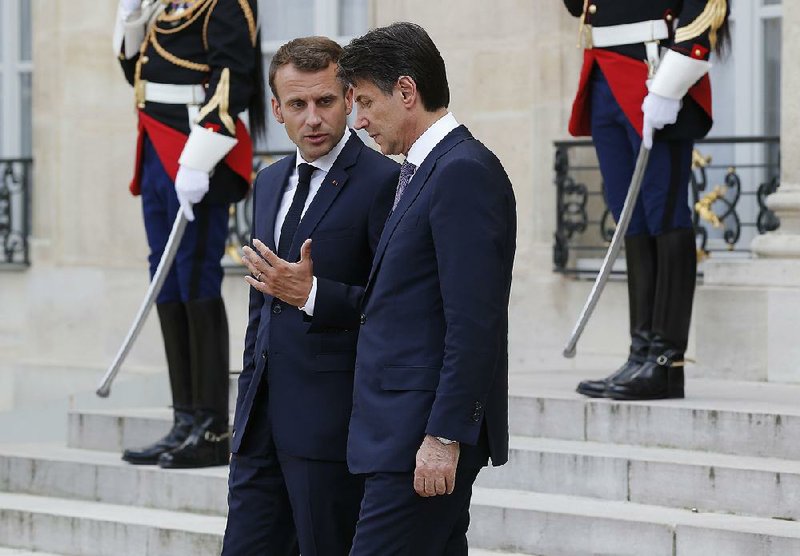PARIS -- French President Emmanuel Macron and Italian Premier Giuseppe Conte agreed Friday to work together to pursue changes to the European Union's migration rules, finding common ground after the issue created a rift between their countries.
The two leaders said during a joint news conference that EU regulations requiring asylum seekers to apply in the first country they enter and remain there while their cases are processed were not working.
Macron said the policy and others have left Italy, usually the first European country reached on the busy migration route across the Mediterranean Sea from North Africa, without the support that is supposed to be a benefit of a united Europe.
"The proper response is European, but the existing European response has not adapted," said the French leader, who is seen as strongly pro-EU.
Conte, who heads the populist, anti-EU government that took over running Italy on June 1, echoed the politician he called "my friend Emmanuel."
"The concept itself of the 'state of first entry' must be rethought. He who puts his feet in Italy puts his feet in Europe," said Conte, who was a law professor before he became premier.
They also both called for steps to beef up Europe's borders to prevent illegal immigration.
Macron cited an initiative of his government last year to establish "protection missions" that pre-screen asylum seekers in Chad and Niger to prevent citizens of the two west African countries from risking the dangerous sea journey.
Conte said Italy is working on a proposal for a "radical paradigm change" in Europe's approach to managing mass migration that includes creating "hot spots" in the most common countries of origin and departure to identify asylum candidates.
These "centers of European protection" would "anticipate and speed up identification and requests for asylum," he said.
Meanwhile, Germany's interior minister fired the head of the country's migration authority amid a scandal over the allegedly improper approval of over a thousand asylum requests.
News agency dpa reported that the German Interior Ministry said Friday that minister Horst Seehofer had informed Jutta Cordt of her dismissal.
Cordt, who took over the agency at the beginning of 2017, was caught in the fallout from a scandal centering on the Bremen branch of the Federal Office for Migration and Refugees. Last month, Seehofer banned that branch from making asylum decisions.
Germany took in more than a million refugees and migrants in 2015-2016, mostly from Syria, Iraq and Afghanistan. Authorities at the time were overwhelmed with a flood of asylum applications.
The meeting between Macron and Conte at the Elysee Palace in Paris almost did not take place after the president offered a harsh assessment of Italy's refusal to accept a private rescue ship carrying 629 migrants. Macron accused the new Italian government of "cynicism" and "irresponsible" behavior.
The migrants who were rescued last Saturday remained at sea Friday. Italy denied the Aquarius a place to dock, insisting it was Malta's responsibility. After Malta also refused and pointed the ship toward Italy, Spain's new Socialist prime minister offered the passengers safe harbor Monday. The Aquarius is currently en route to Valencia, where it is expected to arrive Sunday.
Standing alongside Macron, Conte said it was "time to turn the page" on the diplomatic tensions over the ship and to tackle the larger migration quagmire.
As Conte and Macron mended fences in Paris, Italy's foreign minister met with his Maltese counterpart in Rome to discuss the clash. They expressed "the shared desire to work together in tight coordination, especially in European capitals, about migration in terms of revising" the EU asylum regulations, according to an Italian Foreign Ministry statement.
Pope Francis referred to this week's standoff for the second time in as many days Friday, saying the Gospel teaches that it's wrong to leave migrants "at the mercy of the waves."
Also Friday, Italian news agency ANSA reported that a U.S. Navy ship will offload 40 migrants its crew rescued earlier this week onto an Italian coast guard vessel that will take them to shore.
The Trenton rescued the migrants Tuesday. At least 12 people died when their dinghy capsized.
The Trenton had asked the nearby humanitarian rescue ship Sea Watch-3 to take the migrants, but Sea Watch declined unless Italy assigned it a nearby port to dock. Sea Watch feared that it would end up like the Aquarius.
Meanwhile, Italy's transport minister said members of the country's coast guard are rescuing some 500 migrants who set off from Libya aboard four different boats.
Transport Minister Danilo Toninelli said Italy's actions on Friday show that "no one can say we aren't fulfilling our responsibilities, or that we're racist or xenophobic."
Toninelli said Italy is now waiting for a "strong sign" from the European Union that it will help Italy manage the large number of migrants who arrive in the country.
Information for this article was contributed by Nicole Winfield and staff members of The Associated Press.
A Section on 06/16/2018
